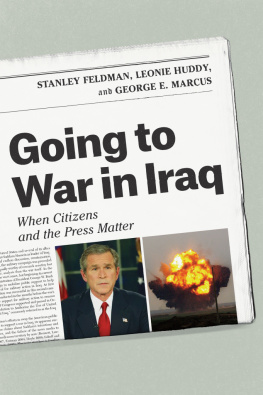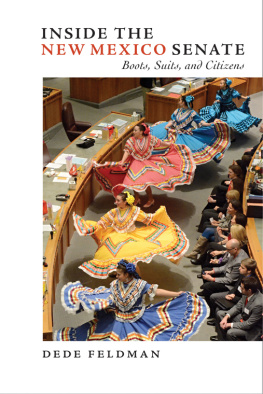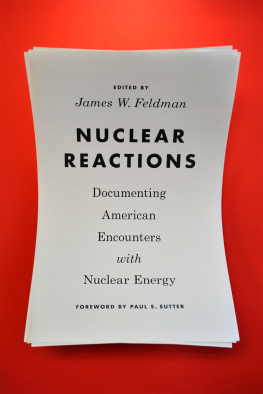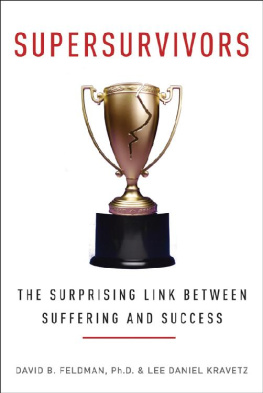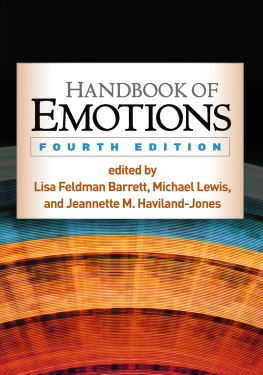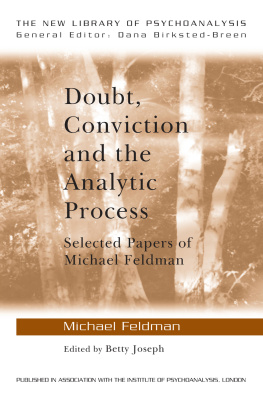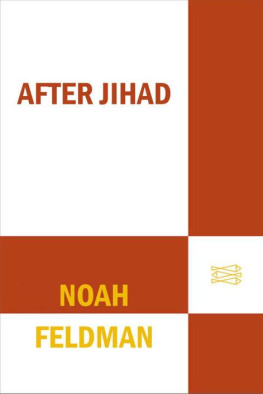STANLEY FELDMAN IS professor of political science and associate director of the Survey Research Center at Stony Brook University.
LEONIE HUDDY is professor of political science and director of the Survey Research Center at Stony Brook University. She is coeditor of The Oxford Handbook of Political Psychology.
GEORGE E. MARCUS is professor of political science at Williams College and the author, coauthor, or coeditor of seven books, including, most recently, Political Psychology: Neuroscience, Genetics, and Politics.
The University of Chicago Press, Chicago 60637
The University of Chicago Press, Ltd., London
2015 by The University of Chicago
All rights reserved. Published 2015.
Printed in the United States of America
24 23 22 21 20 19 18 17 16 15 1 2 3 4 5
ISBN -13: 978-0-226-30406-9 (cloth)
ISBN -13: 978-0-226-30423-6 (paper)
ISBN -13: 978-0-226-30437-3 (e-book)
DOI : 10.7208/chicago/9780226304373.001.0001
Library of Congress Cataloging-in-Publication Data
Feldman, Stanley, author.
Going to war in Iraq : when citizens and the press matter / Stanley Feldman, Leonie Huddy, and George E. Marcus.
pages cm
Includes bibliographical references and index.
ISBN 978-0-226-30406-9 (cloth : alk. paper) ISBN 978-0-226-30423-6 (pbk. : alk. paper) ISBN 978-0-226-30437-3 (e-book) 1. Iraq War, 20032011Public opinion. 2. Iraq War, 20032011Mass media and the war. I. Huddy, Leonie, author. II. Marcus, George E., 1943 author. III. Title.
DS 79.767. P 83 F 45 2015
956.7044'31dc23
2015005540
This paper meets the requirements of ANSI/NISO Z 39.48-1992 (Permanence of Paper).
T he etiology of any book involves at least one if not several complex tales. Our story begins immediately after 9/11 when Feldman and Huddy, agonizing over recent events, hatched a plan to conduct a national survey on American reactions to the attacks on the Pentagon, the World Trade Center, and the downed airliners, an important project supported by the National Science Foundation that also doubled as an effective form of social science therapy. The plot thickened in August 2002 at the annual meeting of the American Political Science Association in Boston, at which Marcus approached them with a proposal to use their study as the basis for a panel survey focused on the impending Iraq war. This approach, we hoped, would enable us to connect prewar reactions to terrorism from late 2001 and early 2002 with reactions to Saddam Hussein and the war as events unfolded in the latter part of 2002 and into 2003. Once again, we were fortunate to obtain funds from the National Science Foundation to turn an invigorating lunch discussion into a major research project.
The staff at Stony Brook Universitys Center for Survey Research capably and cheerfully pitched in and interviewed Americans after 9/11, reinterviewed as many of these people as possible some twelve months later, adding a small group of new interviewees, and then interviewed respondents a third time after the war had begun. In this third phase, some respondents were interviewed right after the wars onset and others after President Bush announced (erroneously in hindsight) that the war was over a few months later. This provided us with information on the publics views on Iraq, Saddam, terrorists, the war, and other related issues before, during, and after the wars onset. In brief, it provided us with a successful panel of pre- and postwar views, a rarity in such situations. We assessed the publics views well before anyone had visibly proposed a war in Iraq, examined changes in public opinion as the war was raised and promoted by the nations leadership, and then finally assessed opinion once the war began. This panel of Americans became the Threat and National Security Survey (TNSS).
Our story continues through a number (more than we like to count) of conferences and meetings of the American Political Science Association, the Midwest Political Science Association, and the International Society for Political Psychology, and sabbaticals, in locales familiar and exotic, in Chicago, Barcelona, Paris, Dublin, Istanbul, and Melbourne, their charms improving the books quality if not speed of production. Through numerous iterations of analysis and discussion, we discovered something intriguing hidden within our data beyond its immediate focus on the political psychology of terror and affect-laden decision making. We uncovered a powerful link among Democrats between newspaper reading and war opposition. We puzzled over this, had a fruitful discussion with John Mueller (who without knowing it spirited this project forward), and decided that the lack of mobilization among Democrats in the fall of 2002 was a project in its own right. We presented our work to our most highly valued critics and interlocutors, members of the New York Area Political Psychology Workshop. There, spurred on by critical comments from Robert Erikson, James Gibson, Danny Hayes, Richard Lau, Robert Shapiro, and many others, we thought more critically and more deeply about our project as it slowly developed into the current book.
Along the way, a number of people improved immeasurably the quality of this project. Huddy presented findings to the Department of Political Science at the University of Michigan and elicited thoughtful objections from Donald Kinder and other attendees. The three of us met in Cambridge to present our findings to a group at Harvard University and received helpful and probing comments from Stephen Ansohlabehere and others present at the seminar. Huddy and Feldman presented the project at the American Studies Center at the University of Sydney and received helpful comments and reactions from Brendan OConnor, David Smith, Rodney Tiffen, and others.
We also shared the first draft of our manuscript with several readers and cannot thank enough Tali Mendelberg and Markus Prior who in record time and with customary insight made sharp and very helpful observations that greatly improved the book. James Klurfeld kept us focused on the politics of foreign policy and added vivid journalistic color to our conversations. John Mueller provided intellectual support and thoughtful objections. We also need to thank effusively John Tryneski whose patience (while not infinite) was sufficient to allow us time to ruminate, argue, and rework the manuscript. His razor-sharp judgment placed an earlier version of the manuscript in the hands of two anonymous reviewers whose comments led us to a richer and more focused analysis that dramatically improved the book.
Finally, a number of people deserve thanks for their very direct assistance in collecting or providing the data on which this book is based. Gary Jacobson very generously shared his treasure trove of polls tracking public opinion on the war; Scott Keeter kindly added data from various Pew polls to complete the picture. Grants SES-0201650, SES-9975063, and SES-0241282 from the National Science Foundation made the national survey possible. We also gratefully acknowledge the assistance of Gallya Lahav, Michael MacKuen, and Charles Taber in the first wave of data collection. In addition, we must thank a group of talented graduate students then at Stony Brook University who coded the news and allowed us to see that the patterns in our survey data originated there. Kathleen Donovan, Christopher Johnston, Charles Klahm, Martijn Schoonvelde, and David Wutchiett collected, read, and coded news stories with care, diligence, and good cheer. Their assistance was indispensable to the success of this project.

